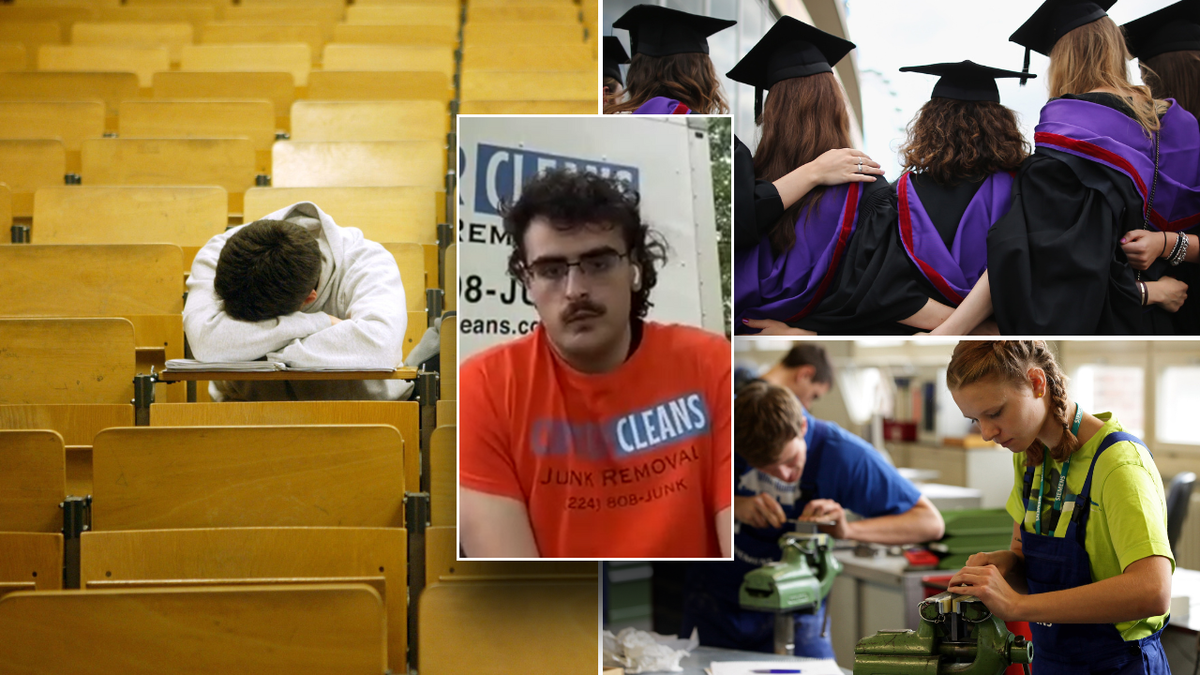Young trade workers on why they chose trade school over college
Contractor Abby Meadors and plumbing apprentice Sam Knowlton explain why they pursued trades as an alternative to college, how much it costs and whether they miss the college experience.
Concerns about the rising cost of tuition and university campus culture are driving a significant number of Americans away from higher education, and entrepreneurs who skipped out on a four-year degree are urging others to follow suit.
Guitar Chalk editor Bobby Kittleberger told Fox News Digital he actively encourages his kids not to attend college.
"I like to put it this way: You never see a dude pull up in a Ferrari and think, 'Oh, I bet he has a college degree!' So, I tell my kids, why would you walk a path that by design does not lead to wealth and prosperity?" he said.
Kittleberger, who also works as a web designer and SEO consultant, has several reasons for pushing his kids away from a traditional university path. Although he graduated with a computer science degree, one of the highest-paying majors right out of college, Kittleberger said his diploma has been "completely irrelevant" to his real-world work and career path.
GEN ZERS ARE 'CATCHING THE WAVE' OF BLUE-COLLAR JOBS THAT AI CAN'T TAKE, TECH CEO SAYS

23-year-old Mikey Fieldman (middle) said those who skip college and enter the labor market often make a higher income earlier in life and have less debt. (Dan Kitwood/Sean Gallup/Getty Images)
In his opinion, the price of a degree has a terrible return on investment. The recent costs of higher education have led many of his friends to work jobs they could have achieved with a high school degree, such as real estate, trading and insurance.
According to the Education Data Initiative, the average cost of attendance for a student living on campus at a public in-state institution is $108,583 over four years. Out-of-state students will pay an average of $182,832 in the same time frame.
Private colleges can be notably higher, with some charging $250,000 or more over four years in tuition and fees. For instance, Kenyon College in Ohio charges more than $71,000 in tuition a year, not including board fees.
Kittleberger said that if someone wants to become a doctor, lawyer or any other profession that requires a degree, college is almost always the best course of action. But for many fields, he said it is absurd to try and learn to make money from professors who have likely never run their own business.
He plans on encouraging his children, especially his two boys, to enter the labor market and learn crucial financial skills.
"These days, we have so much information at our fingertips. You can learn almost any discipline on your own and make yourself incredibly valuable without paying a dime," he added.
According to a 2023 Gallup poll, confidence levels in colleges and universities recently dropped to just 36%, down from 48% in 2018. In 2015, the confidence level in higher education was 57%, based on those surveyed.

Large group of happy college students celebrating their graduation day outdoors while throwing their caps up in the air.
Undergraduate enrollment dropped from 18.1 million students in 2010 to 15.4 million in 2021. While enrollment increased slightly in 2023 following the COVID-19 pandemic, higher education experts have worried that rising college costs and a declining birth rate could drive more Americans away from campuses.
23-year-old Mikey Fieldman is an entrepreneur in Illinois. He said he has never clocked in a day in his life and has been self-employed since he was 14.
In middle school, he started his first business with an iPod touch and made a profit that was not often seen by a 20-year-old. He briefly attended college but soon realized it was not for him. He wishes he had never attended in the first place.
Fieldman spent seven years growing social media accounts that amassed over 7 million followers. He later used the money he earned from social media to start a sports cards and memorabilia business called Field of Cards. Today, he owns his third company, a junk removal business in the Chicago area.
In his view, college and entrepreneurship both have unique advantages and disadvantages that cater to an individual's unique mindset and traits. Colleges, for example, give young adults access to experts in a variety of fields who are there to answer questions and mentor.
"Having that in your back pocket is an advantage," Fieldman said. "You can never know too many smart people."
He also said college provides a unique experience for young adults, as they are surrounded by other people their own age in their formative years. That social setting and the relationships made along the way, he noted, can have tangible value for many people.
$90,000 COLLEGES, THE TOOLBELT GENERATION, AND WHY HIGH SCHOOLS NEED A THREE-TRACK SYSTEM

College students walking on campus.
On the other hand, he said a young person who directly enters the labor market can still go to college campuses and visit friends on the weekend to make up for that.
He noted that blue-collar workers with no degree will likely have little to no debt and can make significant money in a trade right away, often rivaling the salary of entry-level positions for recent graduates.
"If you go into something and then don't pursue it, I feel that's even worse, even if it's the same amount of debt. Like, I know personally, I would feel worse about myself adding that much debt if I wasn't doing anything with my degree," he said.
Fieldman said blue-collar jobs also offer many opportunities for side gigs. However, he stressed that this work can often be hard on the human body.
As the CEO and founder of Premier Staff, Daniel Meursing said he wholeheartedly understands the appeal of sidestepping college to pursue alternative entrepreneurial avenues of growth and fulfillment.
"In a world where traditional education is no longer the sole gateway to achievement, the decision to dive into the labor market early can open doors to invaluable experiences and opportunities," he told Fox News Digital.
MIKE ROWE CALLS GEN Z THE NEXT 'TOOLBELT GENERATION' AMID INCREASING VOCATIONAL ENROLLMENT

College students stand in their caps and gowns at graduation. (Silas Stein/picture alliance via Getty Images)
Like many young adults, Meursing was at a crossroads upon completing high school. He opted to skip the well-trodden path of college to pursue modeling. There, he found a penchant for finance and transitioned into the mortgage industry as a loan officer.
"The decision to forgo college was not without its challenges. However, each obstacle presented an opportunity for growth and self-discovery. Navigating the intricacies of the mortgage industry and later, the event staffing world taught me invaluable lessons in adaptability, problem-solving, and the art of building meaningful relationships," he said.
During the COVID-19 pandemic, the event staffing industry ground to a halt, and Premier Staff was in peril. Rather than succumb to despair, he embraced the challenge as an opportunity to regroup and emerge stronger.
CLICK HERE TO GET THE FOX NEWS APP
Today, his company works with renowned brands such as Bentley, Ferrari, Louis Vuitton, Netflix, the BET Awards and the Oscars.
"To aspiring entrepreneurs and young adults considering alternative paths, my advice is simple: embrace your unique journey, seek out experiences that challenge and inspire you, and never lose sight of your dreams. The road may be unconventional, but the rewards of following your passion and forging your own path are immeasurable," Meursing said.











































